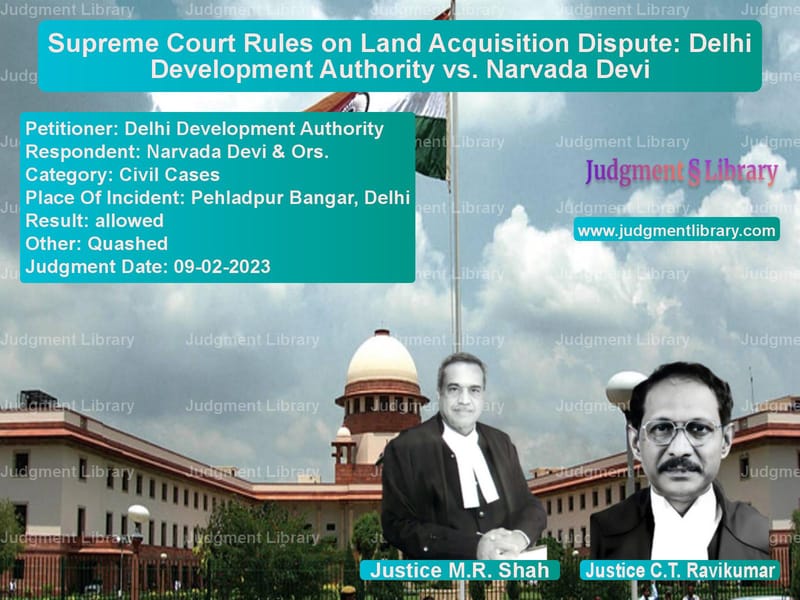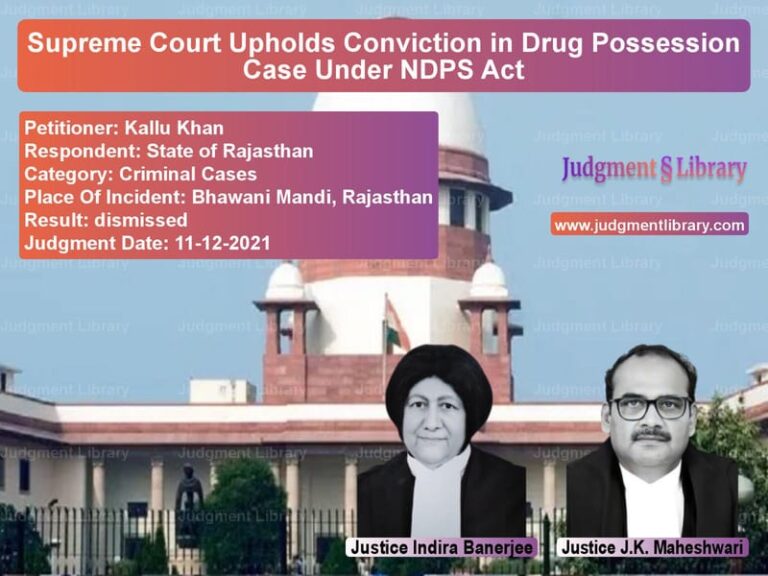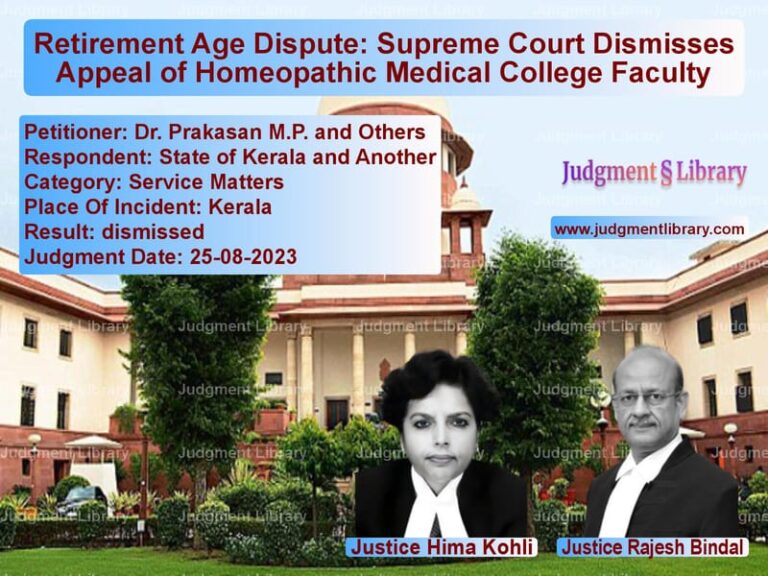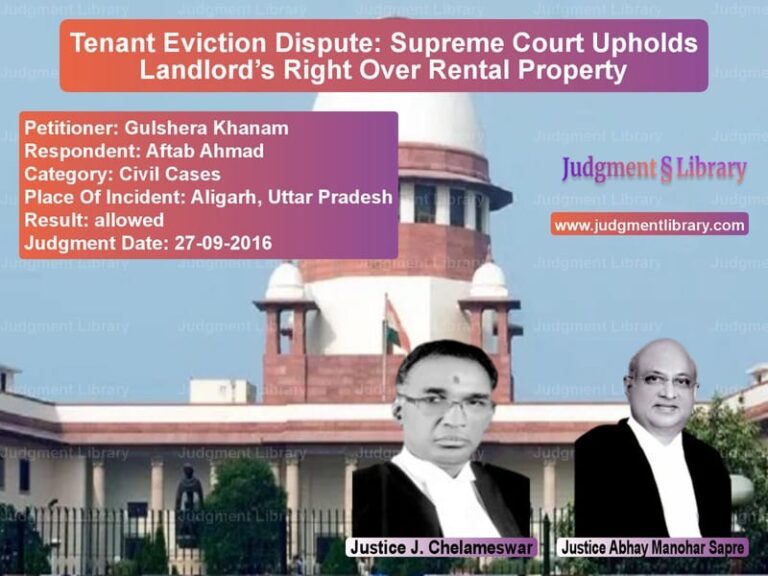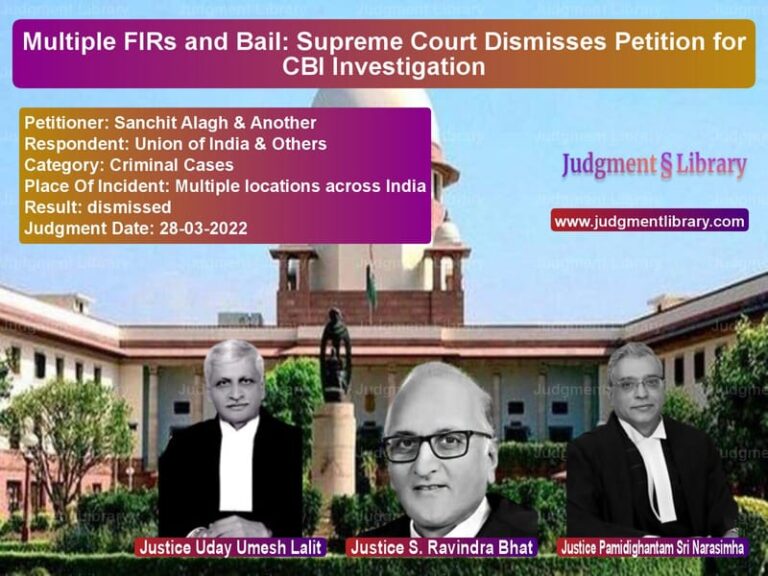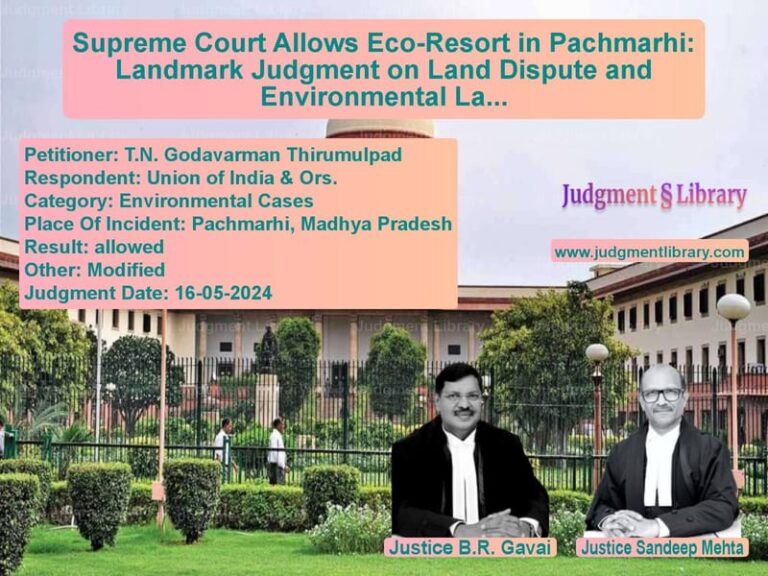Supreme Court Rules on Land Acquisition Dispute: Delhi Development Authority vs. Narvada Devi
The Supreme Court of India recently delivered a landmark judgment in Delhi Development Authority vs. Narvada Devi & Ors., addressing the issue of land acquisition and the applicability of Section 24(2) of the Right to Fair Compensation and Transparency in Land Acquisition, Rehabilitation, and Resettlement Act, 2013. The judgment overturned the Delhi High Court’s ruling, which had declared the land acquisition process lapsed.
Background of the Case
The case involved 504 square yards of land in Village Pehladpur Bangar, Delhi. The respondent, Narvada Devi, had filed a writ petition in the Delhi High Court, arguing that:
- The land acquisition had lapsed under Section 24(2) of the 2013 Act.
- The Delhi Development Authority (DDA) had not taken physical possession of the land.
- The compensation had not been tendered to her.
The High Court ruled in her favor, stating that the acquisition process had lapsed because neither possession had been taken nor compensation had been paid.
Arguments by the Appellant (DDA)
The Delhi Development Authority challenged the High Court’s ruling in the Supreme Court, presenting the following arguments:
“The compensation for the acquired land was deposited with the Land and Building Department, Government of NCT Delhi (GNCTD), through a cheque dated August 9, 2005. The failure to disburse compensation was not the fault of the acquiring authority.”
- The DDA had already taken possession of 457 Bigha 08 Biswa of land in the same village.
- Only certain portions of the land were occupied illegally by encroachers, which hindered full possession.
- The respondent was an unauthorized occupant on government land and had no valid ownership claim.
- The High Court had misinterpreted Section 24(2) of the 2013 Act by assuming that both possession and compensation had to be completed for the acquisition to remain valid.
Arguments by the Respondent (Narvada Devi)
The respondent, Narvada Devi, contended that the acquisition process was incomplete because:
“Neither the physical possession of the land was taken nor the compensation was tendered, thereby making the acquisition process void under Section 24(2) of the 2013 Act.”
Her key arguments were:
- Even if the compensation was deposited with the government, it was not directly given to her, making it legally ineffective.
- As per the provisions of the 2013 Act, an acquisition process would lapse if the government failed to either take possession or pay compensation within five years.
- She had been in possession of the land for decades, and the government had failed to remove her legally.
Supreme Court’s Observations
The Supreme Court extensively examined the Constitution Bench ruling in Indore Development Authority vs. Manoharlal & Ors. (2020) 8 SCC 129. It clarified that Section 24(2) of the 2013 Act does not automatically lead to a lapse of acquisition unless both conditions are unmet:
“Acquisition proceedings do not lapse if either possession has been taken or compensation has been paid.”
The Court further emphasized:
- The presence of encroachments does not invalidate an acquisition process.
- Compensation deposited with a government agency is considered valid tendering under the law.
- The High Court’s interpretation of Section 24(2) was incorrect as it failed to account for the validity of government deposit in acquisition proceedings.
Final Judgment
The Supreme Court ruled:
- The High Court’s decision declaring the acquisition as lapsed was quashed.
- The land acquisition process did not lapse under Section 24(2) of the 2013 Act.
- The respondent was not entitled to compensation under the 2013 Act.
- The DDA’s acquisition was upheld, and Narvada Devi’s writ petition was dismissed.
Implications of the Judgment
This ruling clarifies crucial aspects of land acquisition law:
- Encroachments Do Not Affect Land Acquisition: Unlawful occupation does not prevent the government from taking possession.
- Deposit of Compensation Is Legally Sufficient: Compensation does not have to be physically handed over to the landowner.
- Interpretation of Section 24(2): The provision does not create a new cause of action for challenging past acquisitions.
Conclusion
The Supreme Court’s decision in Delhi Development Authority vs. Narvada Devi & Ors. provides a definitive interpretation of Section 24(2) of the 2013 Act. By overturning the High Court’s ruling, the judgment ensures that technicalities are not misused to invalidate acquisitions. The ruling serves as a benchmark in determining the validity of land acquisition processes in India.
Petitioner Name: Delhi Development Authority.Respondent Name: Narvada Devi & Ors..Judgment By: Justice M.R. Shah, Justice C.T. Ravikumar.Place Of Incident: Pehladpur Bangar, Delhi.Judgment Date: 09-02-2023.
Don’t miss out on the full details! Download the complete judgment in PDF format below and gain valuable insights instantly!
Download Judgment: delhi-development-au-vs-narvada-devi-&-ors.-supreme-court-of-india-judgment-dated-09-02-2023.pdf
Directly Download Judgment: Directly download this Judgment
See all petitions in Property Disputes
See all petitions in Public Interest Litigation
See all petitions in Contract Disputes
See all petitions in Judgment by Mukeshkumar Rasikbhai Shah
See all petitions in Judgment by C.T. Ravikumar
See all petitions in allowed
See all petitions in Quashed
See all petitions in supreme court of India judgments February 2023
See all petitions in 2023 judgments
See all posts in Civil Cases Category
See all allowed petitions in Civil Cases Category
See all Dismissed petitions in Civil Cases Category
See all partially allowed petitions in Civil Cases Category

